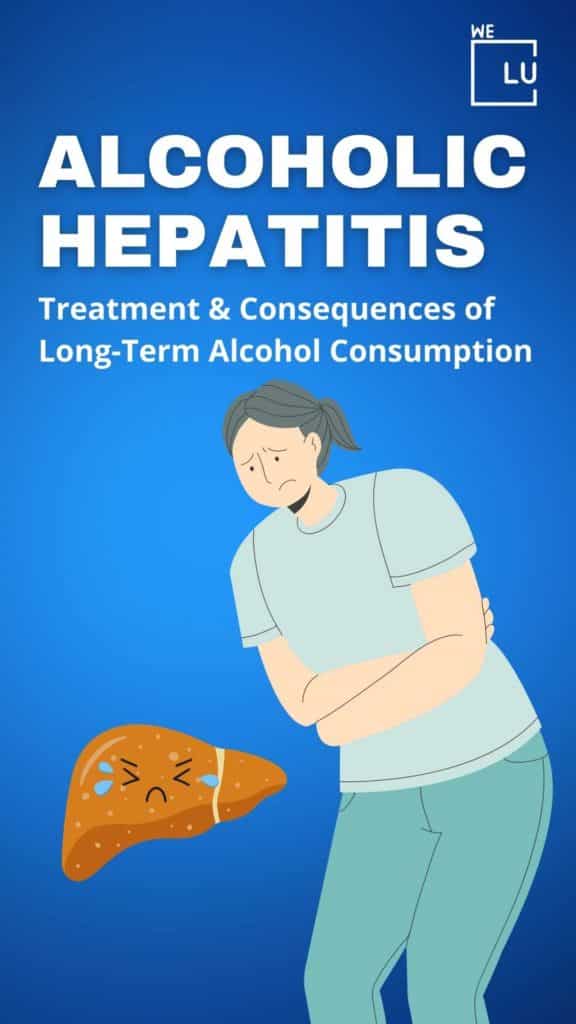What is Alcoholic Hepatitis
Alcoholic Hepatitis is one of many diseases caused by heavy alcohol consumption. It develops when a person drinks large amounts of alcohol over an extended period. This leads to an inflammatory condition of the liver. According to the scientific piece ‘Clinics in Gastroenterology’, chapter 10, ‘Alcoholic Hepatitis’, C.L.Mendenhall, published by Science Direct, “Alcoholic Hepatitis is an acute, toxic degenerative and inflammatory lesion of the liver seen in alcoholics after excess ethanol consumption. Characterized by necrosis, inflammation, and, in some instances, alcoholic hyaline. It does not necessarily include fatty liver, fibrosis or cirrhosis of the alcoholic, but may frequently be associated with these conditions”. [1]
This is a very dangerous and life-threatening condition, there’s a high percentage of people who die from this disease between the first and sixth months. This is why appropriate diagnosis and treatment are essential. As stated by the scientific article ‘Alcoholic Hepatitis: Current Challenges and Future Directions’, Ashwani K.Singal, Clinical Gastroenterology and Hepatology, Volume 12, Issue 4, “Alcoholic Hepatitis is a distinct clinical syndrome among people with chronic and active alcohol abuse, with a potential for 30%–40% mortality at 1 month among those with severe disease. Corticosteroids or pentoxifylline are the current pharmacologic treatment options, but they provide only about 50% survival benefit”. [2]

Causes of Alcoholic Hepatitis
The liver is the responsible organ for alcohol processing. When a person is used to drinking alcohol in a heavy way, this process produces highly toxic chemicals. These chemicals can injure the liver cells. This injury then leads to inflammation and Hepatitis. Although heavy alcohol use leads to Alcoholic Hepatitis, doctors aren’t entirely sure why the condition develops. Hepatitis caused by alcohol develops in a minority of people who heavily use alcohol — no more than 35 percent according to the American Liver Foundation. It can also develop in people who moderately use alcohol.
Symptoms of Alcoholic Hepatitis
The symptoms of this type of hepatitis vary depending on the amount of damage to the liver. If you have a mild case of the disease, you may not experience any symptoms.
owever, according to Healthline.com, [3] as more damage occurs, you may begin to experience:
- Changes in appetite
- Dry mouth
- Weight loss
- Nausea and vomiting
- Pain or swelling in the abdomen
- Jaundice, or yellowing of the skin or eyes
- Fever
- Changes in your mental state, including confusion
- Fatigue
- Easy bleeding or bruising
On the authority of the scientific piece ‘Symptoms and signs of acute Alcoholic Hepatitis’, G. Basra, S. Basra, S. Parupudi, published by the World Journal of Hepatology, “Although there is not one specific sign or symptom related to Hepatitis caused by alcohol, a constellation of symptoms and signs can help make the diagnosis of this condition with reasonable accuracy.
Patients with Alcoholic Hepatitis may also present with withdrawal symptoms. Mild to moderate symptoms include irritability, anxiety, headache, sweating, tachycardia, and hand tremors with clammy skin. Severe symptoms include delirium tremens in which the patient is confused and may have visual hallucinations along with agitation, convulsions, and fever. The frequency of alcohol withdrawal is inversely proportional to the severity of Alcoholic Hepatitis with 35% cases with mild disease and 15% of severe disease”. [4]
Clinical presentation after abstinence for more than 3 months should raise doubts about the diagnosis of this condition and dictate the need for considering other causes of liver disease, decompensation of alcoholic cirrhosis, sepsis, and malignancy as the cause of a patient’s clinical profile. The symptoms of this kind of hepatitis are similar to those caused by other health conditions. If you develop any of these symptoms, you should contact your doctor to get a proper diagnosis and begin treatment.

Prevention Methods
The best way to prevent Alcoholic Hepatitis is to avoid alcohol consumption, or if the person likes to drink, to do so in a moderate way. This is defined as less than two drinks per day for men and less than one drink per day for women. If a person is suffering from alcohol abuse disorder, stopping drinking can be a difficult process, but therapy such as alcohol abstinence abuse programs and inpatient rehab can offer support and are often favorable ways to help patients recover from this condition.
You can also prevent Alcoholic Hepatitis by maintaining a healthy weight and by protecting yourself from hepatitis B and hepatitis C. Hepatitis B and C are blood-borne diseases. They’re transmitted by sharing needles and other equipment for drug use or through somebody’s fluids by having unprotected sex. Currently, vaccines are only available for hepatitis B, but not for hepatitis C. [3]
How is Diagnosed?
If you present any of the aforementioned symptoms of Alcoholic Hepatitis, it is very important to be truthful to the doctor about one’s alcohol consumption history. They may also perform a physical exam to see if there is an enlarged liver or spleen. They may decide to order tests so they can confirm the diagnosis. These tests could include:
- Complete blood count (CBC)
- Liver function test
- Blood clotting tests
- Abdominal CT scan
- Ultrasound of the liver
The doctor may order a liver biopsy if needed to confirm a diagnosis. A liver biopsy is an invasive procedure with certain inherent risks. It requires your doctor to remove a tissue sample from the liver. A liver biopsy will show the severity and type of liver disease.
Acute Alcoholic Hepatitis
Acute alcoholic hepatitis is a potentially life-threatening situation that can affect 10% – 30% of individuals with acute alcohol intoxication. Acute alcoholic hepatitis typically occurs after more than 10 years of regular heavy alcohol use; average consumption in one study was 100 g/day (the equivalent of 10 drinks per day). However, usually develops within a few days or, more commonly, 2-3 weeks after stopping drinking. However, it may also develop long after periods of heavy drinking (months to years).
Acute alcoholic hepatitis occurs when ethanol-induced liver damage overwhelms the ability of hepatocytes to regenerate. Acute alcoholic hepatitis is an independent predictor of early, increased severity of illness and increased mortality compared with acute viral hepatitis, which often presents with jaundice, fever, malaise, anorexia, and nausea/vomiting.
Treatment Options
Alcoholic Hepatitis is a condition that’s caused and aggravated by alcohol use. It is imperative to stop drinking if you receive an Alcoholic Hepatitis diagnosis. The liver’s damage can also be reversible if the person avoids drinking in the early stages of the disease. On the other hand, if there’s more significant damage, the changes within the liver become permanent. Significant damage can lead to conditions such as cirrhosis, blood clotting problems, and high levels of bilirubin.
There’s always a benefit to quitting drinking. If you have an alcohol addiction and need help to stop drinking, We Level Up Treatment Center can give you the support you may need to reach alcohol detoxification and recovery. Treatment may include medications that reduce inflammation in your liver and improve liver function.
Your doctor may also prescribe vitamin and nutrient supplements if you’re malnourished. These nutrients may need to be provided through a feeding tube if you’re having trouble eating. Feeding tubes pass nutrient-rich liquids directly into your digestive system through a variety of methods. A liver transplant also can be taken into consideration if your liver is severely damaged. To qualify for a transplant, the client must demonstrate they won’t continue drinking if they receive a new liver. You’ll also need to abstain from alcohol for at least six months prior to the transplant. In some cases, you may need to seek counseling as well. [3]

We Level Up provides a solid support system that goes beyond the walls of the treatment facility.
There’s always new research for new treatments, so what is expected is that people who suffer from this condition can have more hope of survival in the future. According to the scientific piece ‘Treatment of Severe Alcoholic Hepatitis’, M. Thursz, T. Morgan, Gastroenterology, Volume 150, Issue 8, “The optimal treatment for patients with severe Alcoholic Hepatitis is prednisolone, possibly in combination with N-acetyl cysteine. At present, only short-term increases in survival can be expected—no treatment has been found to increase patient survival beyond 3 months. Abstinence is essential for long-term survival. New treatment options, including liver transplantation, are being tested in trials and results eagerly await”. [5]
Alcohol Treatment Center in California
If you’re suffering from Alcohol Hepatitis and feel like you just can’t stop drinking, we can offer the support you need. We Level Up Treatment Center can provide you, or someone you know, the tools to treat alcoholism professionally and safely. Feel free to call us to speak with one of our counselors, we can inform you about this condition by giving you relevant information, our specialists know what you are going through. Have in mind that each call is private and confidential.
Sources:
[1] C.L. MENDENHALL, 10 – ‘Alcoholic Hepatitis’, Clinics in Gastroenterology, Volume 10, Issue 2.
[2] Ashwani K. Singal, Patrick S. Kamath, Gregory J. Gores, Vijay H. Shah, ‘Alcoholic Hepatitis: Current Challenges and Future Directions’, Clinical Gastroenterology and Hepatology, Volume 12, Issue 4.
[3] ‘Alcoholic Hepatitis’ – Healthline.com
[4] G. Basra, S. Basra, S. Parupudi, ‘Symptoms and signs of acute Alcoholic Hepatitis’, published by the World Journal of Hepatology
[5] Mark Thursz, Timothy R. Morgan, Treatment of Severe Alcoholic Hepatitis, Gastroenterology, Volume 150, Issue 8.





